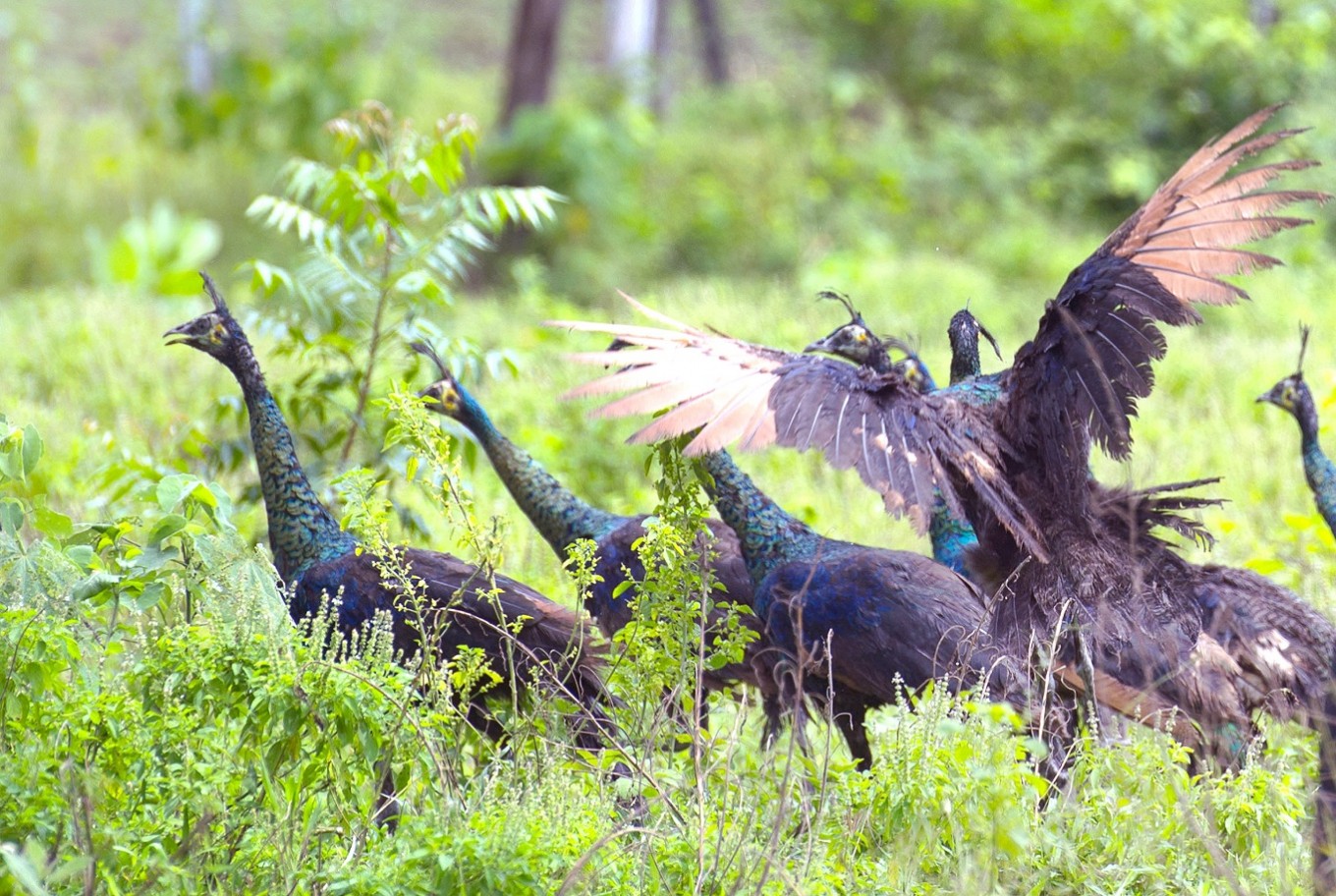Popular Reads
Top Results
Can't find what you're looking for?
View all search resultsPopular Reads
Top Results
Can't find what you're looking for?
View all search resultsEndangered birds find home in Baluran National Park
The rescue center originally tended to 10 Java peafowl, but one died from a respiratory disorder during its habituation process in a temporary cage.
Change text size
Gift Premium Articles
to Anyone
A
fter a year of special care at the Wildlife Rescue Center in Yogyakarta, nine green peafowl were in February released to their habitat in Baluran National Park, Situbondo, East Java. Known as green peafowl of Java (Pavo muticus), these beauties have regained their freedom at the eastern tip of Java.
“Finally, we’re relieved to see the peafowl back home and were happy to have raised them for a year in Yogyakarta. We were anxious on our way to Baluran, controlling their condition every two hours, but now we can dine comfortably,” said veterinary surgeon Randy Kusuma from the rescue center after releasing the peafowl.
The rescue center originally tended to 10 Java peafowl, but one died from a respiratory disorder during its habituation process in a temporary cage.
“We’re still pleased to be able to return the rest to their habitat. These birds were like domestic chickens when we raised them and they’ve now grown larger, ready to live in the wild. This is really a delight for our team,” Randy said.
Overjoyed by the addition of nine young peafowl, Baluran National Park chief Bambang Sukendro expressed his hope that these birds could further support Baluran’s status as a national park.
“This park will continue to conserve Indonesia’s natural riches so that our future generations can observe the diverse wildlife species here. It would be [a shame] for them to only see these animals in the form of stuffed dolls or in photos,” he said.
Read also: Masigit Kareumbi Hunting Park calls for Conservation
The park, with its mountain, savanna and beach zones constitutes the last bastion of fauna endemic to Java Island, such as peafowl, jalak putih (Sturnus melanopterus), deer, buffalos and banteng (Bos javanicus), according to Bambang.
Cooperation between the government and private institutions is therefore necessary to safeguard the wildlife sanctuary.
The recent release was also arranged through a cooperation between the Yogyakarta Nature Conservation Foundation (YKAY), the Center for Orangutan Protection (COP), and the Yogyakarta Natural Resources Conservation Agency (BKSDA Yogyakarta). Besides peafowl, three sanca bodo (Python molurus) snakes were also released into the national park.
The 12 animals were confiscated from illegal animal traders and given up by residents before arriving at the rescue center, which is owned by the YKAY in Sendangsari, Pengasih, Kulonprogo regency, Yogyakarta.
The birds were seized in an operation conducted by the National Police, the COP and the Jakarta Animal Aid Network (JAAN) in 2016. They were still chicks at the time and kept by traders in poor condition, which adversely affected their health.
Read also: Sumba’s MaTaLaWa National Park lures visitors with ecological attractions
The choice of Baluran was based on the original habitat of the peafowl and pythons. Each animal was subjected to final examinations before being set free, followed by individual markings with microchip implants and with tagging and coloring for the birds, to facilitate observations by a monitoring team.
YKAY chief patron, Gusti Kanjeng Ratu Mangkubumi considered the release a concrete step of her foundation to help conserve the wildlife of Indonesia.
“This is our program and social responsibility as a conservation agency. We indeed needed large funds for this purpose, which we raised ourselves. So, we’re hoping for government and private participation in this wildlife rescue effort,” added Gusti Mangkubumi.
She also appealed for increased public awareness against buying and breeding wildlife species.
“The public should realize that wild animals are not domestic pets. If people keep breeding such species, the illegal trade will persist [and lead to] long-term impact in the loss of our wildlife,” she pointed out.
The COP action coordinator, Daniek Hendarto, said his center supported the return of the animals, which had served as evidence of last year’s aborted illegal wildlife deals.
Read also: RI leadership seen as crucial to protecting Coral Triangle
“This was all a collaborative effort: the center’s legal action, the [animals’] rescue and their subsequent release,” Daniek said.
Untung Suripto, head of the BKSDA Yogyakarta, said the threat of extinction is a direct result of illegal wildlife hunting and trading. Law enforcement therefore plays a large role in acting as a deterrent to these crimes.
“Peafowl and pythons are protected animals under Law No. 5/1990 on biological resources conservation and the Government Regulation of 1999,” said Untung.
The Bantul District Court, Yogyakarta, last year found a man named Muhammad Sulvan guilty for illegal wildlife trading and sentenced him to 10 months in prison, Untung pointed out. The confiscated animals were turned over to the rescue center for further care, then released in Baluran National Park.











